#this is my favorite solas' line ;_;
Explore tagged Tumblr posts
Text

Veiltober "Fen'Harel" "I would treasure the chance to be wrong once again, my friend..."
#my art#dragon age#veilguard#dragon age 4#dragon age veilguard#veiltober#da fanart#solas#fen'harel#dragon age art#this is my favorite solas' line ;_;
215 notes
·
View notes
Text




Idk why but I have been turning these lines around in my head since I first played the tricking ending. Do you think he realized how much he sounded like Elgarnan at the end? Does it haunt him?
#dragon age#solas#oc: ena de riva#dav spoilers#this is genuinely some of my favorite lines of his and i could not tell you why#'you are a mortal and i am a-' do you think he was going to say god. do you think he realized#that he had become what he wanted to destroy? do you think he looked at rook and saw a younger version of him?#a person fighting to protect their world... is that not what he was all those years ago?#'a fool. a fool who has met his match' CLAWING AT MY ENCLOSURE HHRHG#i was talking about this with a friend so i rewatched this cutscene#oughghh trick ending my beloved...#crow rambles#worldstate: mage rights
11 notes
·
View notes
Text





Shoutout to my favorite line of Crow!Rook backstory in the game.
Atticus De Riva, obliterated, getting an ugly Fen’Heral back tattoo at his Crow initiation party. (Solas Disapproves)
942 notes
·
View notes
Text
Building off this post by @karissaeb
What an incredible catch. I've only played through the ending once so far and I think I was so busy taking everything in that I didn't notice, but wow. Spite using his own voice to tell Solas to fuck off. "You hurt Rook. You lie."
How does Spite see Solas? In lines with other characters who refer to Solas as Pride, Solas says that he prefers Wisdom. I talk a bit here about Spite vs Determination and even use Pride vs Wisdom as an example, but...we can all agree this point that Solas isn't wise, right? Clever, sure. Wise? A wise man would know when to call it quits. When yearning for the past becomes too detrimental to the future to be worth doing. When Solas calls him "Determination" and Spite corrects him, it serves several purposes.
1) Spite tells Rook that there are three kinds of people: Family, enemies, and contracts. Solas is an enemy. Friends or family are allowed to call him Determination if they feel so inclined (Rowan, Isabella) but Solas is not in this category, as Karissa mentions, and Spite wants (spitefully!) to let him know that.
2) It reminds Solas that what happens to you shapes you. The way you respond to those events shapes you. Determination? Pah. Spite is something sharper, something more vindicating, something angrier. Wisdom? Pah. Pride is manipulation towards your own goals instead of guidance. Pride is insistence in your own views with disregard to all others. Solas is changed and warped by trauma. Spite's correction is a reminder and a demand. Acknowledge what changed me, and what changed you.
And the delivery of this line! It's not sharp and abrupt, not curt like you'd expect of someone who doesn't want anything to do with this guy. "Spite," he says, and I almost felt like I could hear him smile and turn up his nose there, like he was flashing his teeth. He sounds pleased with his own identity and threatening all at once, the way Lucanis sounds when he says "The Crows send their regards."
And when Solas offers his help, that mask slips. Now those bared teeth sound gritted. Now there is an echo of something dark underneath his voice, and it's his voice.
This is the only time in the whole game that other people get to hear Spite's voice, aside from the time in Rook's mind prison and Emmrich's unique ability.
Referencing yet another of my posts, Spite speaks in slow chunks of sentences because he has to force his way to the surface of their body. He has to wrest control of Lucanis's mouth from him, and even after they reconcile and his speech improves a bit, it's clearly a struggle.
Spite is not a weak spirit, but speech through a mouth with two souls at the helm is difficult. You know how you become stronger when overcome with rage or panic? Perhaps it was easier because the Veil is thin here, with all the magic bullshit happening, but I can't help thinking it's a combination of the two. Solas has offered to rip Spite away from Lucanis, who I maintain that Spite loves, and he's hurt Spite's favorite person. Rook, who opens doors for him, who accompanied him steadfastly to Lucanis's mental inner sanctum. Rook, the only person to listen to him, to offer him a rope that would lead to his freedom. Rook, who is one of the very few people Spite can claim a relationship of any kind with.
Why should he trust Solas with Lucanis when Solas hurt Rook? When Lucanis and Spite where there when Solas sealed Rook away? When Rook vanished before their eyes? Can you imagine the thick, palpable, choking fury that would've overcome him, hearing that audacious offer?
This to me is the most blatant and tangible way Spite has shown his love throughout the game. The raw emotion in this single action is so, so potent. Fuck you, you lie. Know that all this love, and all the righteous anger that accompanies it, is mine.
#SPITE AND LUCANIS LOVE EACH OTHER AND THEY BOTH LOVE ROOK#i am dragged off stage coughing up blood and yelling#spite dellamorte#spite dragon age#lucanis dellamorte#dragon age rook#rookanis#veilguard spoilers#datv#dragon age veilguard#veilguard#cathedralposting#spite x rook#spite x rook x lucanis
467 notes
·
View notes
Text
Blackwall. I don't know why, perhaps it's the combination of him working with his hands and having the need/opportunity to do so arise so often in his daily life.
Sera would scorn it at first maybe ("lay off, the holes're hurting no one" and would think it's so hilarious when the backside of her pants split open), but the more she watches Blackwall the more convinced she is of how punk it is, and starts learning from him with gusto. Maybe even outpaces him, but not in a socially-recognized way. Her stitches are gaudy and obvious, turned into decorations. His are furtive, secret, you hardly know they're there.
Cole wants to learn too, something about changing something and it's still the same really appeals to him, but he doesn't quite get that you need a rip first to repair. He just ends up adding new stitches to undamaged clothes, in ways that make them unwearable (the collar stitched closed, sleeves tangled and sewn to the torso).
Sera tries to teach him by ripping a new hole for him herself, but Cole doesn't take that well ):
#dragon age poll#Dragon age inquisition#Companions#Nice to see a poll line up with my expectations#Solas has to teach himself after he wakes up so he's not quite as good yet but give him a few hundred years#Vivienne though? Ripped clothes? When has she ever?#Poor Josie probably learned as a kid and has quite a knack for it#But do you think she has the time?!#She resigns herself when her favorite sleeves snag on a wooden door frame to finally giving them up#Only to have them mysteriously delivered to her door with the cleanest most invisible repair
38 notes
·
View notes
Text
Compilation of snippets from the DA:TV acting talent panel at SDCC (Dragon Age: Meet the Heroic Companions of Thedas) today (July 26th). DA:TV spoilers under cut.
Huge props and tysm to the users who live-tweeted and clipped this panel, you are heroes 🙏💜!!
The panel was moderated. In attendance were John Epler, creative performance director Ashley Barlow, and the actors of Lucanis, Neve, Emmrich, and Harding - Zach Mendez, Jessica Clark, Nick Boraine, and Ali Hillis respectively.
The panel ended with a Q&A session.
(BioWare have stated that a recording of the panel will be made available at a later date.)
Edit/update: I've now been through this post and tidied it up :)
---
Here are some pictures from the panel [source]
Here are some more pictures from the panel [source]
In this Twitter thread there are also some video clips of parts of the panel [source]
BioWare tried to avoid spoilers in the panel [source]
Key points/summary of DA:TV: hunting Solas, found family companions, stop the elven gods [source]
When auditioning the companions, BW were specifically looking for character chemistry [source]
BW used motion capture for the game [source]. Mo-cap was mentioned a lot in the panel [source]
Lucanis sees assassination as a job. His mind is as dangerous as his knives and he is also "kinda hilarious" [source]
There was mention of other Crows [source]
Zach Mendez read Tevinter Nights like three times [source]
A clip of the actors doing mo-cap was shown [source]. Photos of Zach mo-capping for other characters was shown [source]
BioWare said that Zach brought a certain darkness to Lucanis [source]
Zach is excited for the romance and is looking forward to the stats [source]
Zach mentioned that he used his own relationship with his brother in his portrayal of Lucanis [source] (surely this means ILLARIO.. ?👀)
Zach played a lot of darkspawn originally while auditioning [source]
Ali Hillis really welcomed Zach into the DA family [source]
Neve is from Minrathous. She has fun banter and is a cynical detective with a heart of gold. They want to show a rebellious side of Tevinter [source]
Jessica Clark loves Neve's loyalty, dedication, and different vision of Tevinter
Neve is fighting for the people [source]. Jessica: "She is really really fighting for those people, and she loves those people. So, yes, she's cynical, and yes she's kind of tough and brusque and all these other things, but when they say there's a heart of gold, there really, like, to have that kind of a passion and dedicate your life to something like that, I think that's definitely my favorite part about her" [source]
Jessica loves how much Neve loves Docktown and its people [source]
Neve sees a different vision for Tevinter than what has previously been depicted in the series [source]
The actors were separate from one another while recording lines but still bonded really well and organically [source]
There are several Veilguard gc [source] (groupchats?)
Ali is an angel and very supportive of the new cast [source]
Emmrich is a "stone cold silver fox" (this is a quote from the panel moderator) [source]
BioWare knew the reaction they would get about Emmrich from the fandom [source]
Nick Boraine feels like he's been preparing for Emmrich all his life. He's obsessed with death (as a comfort and not scary) and enabling people to transition into death. He is attracted to this aspect of the character [source]
"You're gonna need a dictionary for Emmrich" for all the magic spells [source]
"Interesting how this character caught fire compared to the other sexy characters" [source] (I think this was said wrt Emmrich?)
BW had a great time recording with Nick, he is a very consistent actor [source]
Nick and Matt Mercer have never met [source]
Manfred plays off of Emmrich. "I set the tone" [source]
What has Harding been doing in-between DA:I and DA:TV? She's been working closely with Varric and the Inquisition remnants. She and Neve already met in the comics [source]
Ali vividly remembers the beginning of voicing Harding, she says it's brilliant writing. She really thought of Harding's personality and traits. She's so happy to be back [source]
wrt the Covid-19 pandemic and the year 2020, BW had to pivot with working remotely and were able to push through their projects. [source]
"[Harding] chasing Solas for a decade..." "that was a great relationship that [you] developed... and now I'll stop talking now". Ali was excited [source]
John Epler talked about how companions may but heads, and won't be predictable [source]
There are thousands and thousands of lines and so many characters to meet [source]
Zach "unfortunately has been around the DA Reddit before recording as Lucanis" [source]. He feels inspired by all the fans and cannot wait for us to play it [source]
[new textblock due to character limit!]
John Epler on Emmrich: "I mean honestly, I will say, like, we expected a great reaction to Emmrich. Went beyond what we expected for sure. But it’s been fascinating to see, because again, Emmrich is this character, he’s more of the professorial, more, he brings a wisdom and kind of a calmness to the group, so even when things are at their worst, there’s that one person in the group who is kinda like, ‘okay, y’know, we've got, let's figure it out, let’s take a deep breath’. And just his journey through his character arc, and his interactions with the others, it’s been fantastic to see. Even just finding opportunities for him to bounce off the other characters, you know, the way he talks to Bellara, the way he talks to Neve, it’s all so different, but it’s also just, again, based around this core of this warm, kind-hearted, professorial necromancer. Which, again, is not something you see a lot of in media. I mean, usually, necromancers are depicted in a very specific way. But it’s been, it's awesome to see how Emmrich has grown and just, really one of the most, one of my favorite experiences has been just working with Emmrich’s writer, working with Emmrich as a character." [source]
All the actors are excited about the dialogue and narrative, and for us to explore DA:TV [source]
Ali says that we will really find ourselves in this game [source]
During the recording process, the actors all hear the previous person's recording and react or respond to it [source]
Due to Covid-related lockdown, a lot of recording was done over Zoom, and the writers besides Ashley Barlow (creative performance director) would jump in on the call to talk about the previous person’s lines [source]
A question was asked about the background factions. "Characters not causes". [source]
You can work with the Grey Wardens in the game (for example) [source]
The actors all met this weekend. They are an "un-chosen" family [source]
Zach stood in for multiple characters for mo-cap, for example he was Assan [source]
Lucanis has a heart but is stubborn and stuck in his ways. Zach is excited for fans to help his character open up as the story progresses [source]
Jessica is incredibly honored to join the DA universe. She is new to voice acting for video games. “This is play pretend. Playing Neve allowed her to step into her power.” [source]
A question was asked on what their first exposure to fantasy was, and do they implement this into the acting? John talked about Lord of the Rings and how every media you experience will seep out into your work [source]
Ashley didn't want the dialogue to sound modern [source]
Zach loves Theseus and talked about the symbolism in DA [source]
Jessica loves Greek mythology and lore [source]
Nick talked about The Hobbit and how he would dress up in big boots and a cape when his mother would read to him [source]
Ali recently went to Greece and felt like she saw DA everywhere [source]
A question was asked - "From your companion's perspective, which previous companion would you romance?" Zach kind of has a thing for The Iron Bull, saying "oh that awakened something inside of me". He also likes Dorian. Jessica was too overwhelmed to answer. Nick was also overwhelmed by the question, but thinks Solas is sexy [source] [source]
Ali fangirled over Lucanis and Emmrich [source], prefers Emmrich [source]
A question was asked - "Is DA:TV and DA:I streamlined together?" [paraphrased]. Answer: DA games are not as streamlined as Mass Effect and act almost as standalones [source]
The cast were asked about which aspect of their character is their favorite. Ali loves the little quirks about Harding. "Lucanis is a good cook!?" ** Neve is very dry and pretty closed off about it. For Emmrich, it's the "exploration of the idea of death and necromancy" [source] (** FINALLY CITATION for this? :D)
A question was asked: "How do you decide to introduce the lore in each game?" BioWare answered that it depends as they build each game. They always know the base lore, and see opportunities through game mechanics and characters. They try not to infodump [source]
A question was asked: "Any favorite party banter?" Ashley Barlow said to listen for "hand to bone combat" [source]
The game takes place approximately 10 years after the end of DA:I. You start the game hunting for Solas. The game is built on some core principles: be who you want to be in a world worth saving and with characters that matter. The companions are always at the heart of DA and they are at the heart of this game too. [source]
The moderator asked John Epler about what is bringing this party of people ("this rogues' gallery") together. John: "I mean, it's the end of the world, and each character that you bring into your party understands that the world is ending, that they need to stop that, and you're really building, what I would say is, more of a found family. These are characters who may not start off liking each other, may not even start off liking you, but over time they grow to understand the importance of what they're doing and just, how critical it is to stop the elven gods" [source]
"He is kind and has some spectacular lines. He is a natural nerdy scientist. He loves learning." [source] (Emmrich? ^^)
Ali didn't realize that Harding was such a beloved character. She thanked fans for bringing this character back [source]
Ali is super excited that the game is releasing. She said that there has been an evolution to Harding's character and that she's been chasing Solas for like a decade at this point [source]
Jessica loves the writing in the game [source]
Nick loves its narrative [source]
Ali said that this game is going to take you into a world that will blow your minds [source]
On Manfred: Nick was asked what it was like having another character to bounce off of. He said "Oh man! I mean, that is such a hard question, because Matt and I have never met, and we worked completely separately, and, I, I mean I know that the rapport is really great, but it's in the ether, I mean it is just, the magic that these guys create, telling us how to respond, how to do that, but it's, I can't wait to meet Matt" [source]
BW still said that the game's release window is Fall 2024 [source]. Nothing more specific was given [source]
There are also more snippets here in this Tumblr post, go check it out!
[source, two]
#dragon age: the veilguard#dragon age the veilguard spoilers#dragon age: dreadwolf#dragon age 4#the dread wolf rises#da4#dragon age#bioware#video games#long post#longpost#solas#dragon age: tevinter nights#covid mention#mass effect#dragon age: the missing#dragon age: the missing spoilers#if any of the source links are incorrect pls lmk ^^#there is a lil bit of repetition in here sry as it's a compilation of 2 different twt threads covering the same event!#if you caught any other livetwt threads for the panel that isn't included here pls lmk ^^#Edit/update: I've now been through this post and tidied it up and collected some stray tweets :)
553 notes
·
View notes
Text
I've been talking to my friend about Solas again (always). This is the friend who got me into Dragon Age- she spent years slowly suggesting it. Good on her. Anyway, I was unspoiled going into Inquisition. She told me if I was unsure about who to romance she suggests Solas, it's fun she says. Ok.. really? He seems boring.. and Cassandra is right there? Turns out Cassandra is straight (big sigh) so ok, I'll try the romance with the guy who already pissed me off a bit with his opinions on the Dalish..
And I fell pretty hard. The mystery.. what is going on with this guy? Why can I never guess what his opinions will be? It's hidden depths on hidden depths with this guy. And then he's got you. I mean, also the Welsh accent, that helps too.
I take him to Halamshiral and I'm snickering to myself because I think he's going to *hate* it and he's going to have some funny lines about how much he hates this. They call him my elven serving man? Oh boy, I'll never hear the end of this. And then I'm blindsided by the "sexy man lean" and he seems tipsy and the "power, intrigue, danger, and sex" line. Jaw on the floor surprised by this behavior. Why does he seem like he's in his element?
Then after Adament he's so mad about the Grey Wardens? But won't really elaborate? The heck man??
We go to the Temple of Mythal and my poor Inquisitor's world is even further turned upside down. What even is happening anymore? And then of course I run to Solas back at the rotunda to talk about all this and he's mad about the Well but like.. we had no good choices? What do you even want?
But now we're going on a romantic date?!? This is amazing! Beautiful, this is so sweet! Holding hands on a moonlight stroll?? Never been so into this. And then utter whiplash.. what is happening.. this come out of left field why are we breaking up?? Is it because I didn't let you remove the tattoos? Crying.
Utter devastation. But we have to finish this. All will be clear when this is over? Alright man, gotta push through then. He goes back to calling you "Inquisitor" the pain..
And the game ends and you go back to your room. Nothing is made clear. There's no note?? I was expecting a note at least.. something. He said.. utter desolation. Post credits scene- Mythal calls him "Dread wolf".. why would she do that? Hilarious. ???
Now, I'm lucky, and I didn't play until 2021 so the next day I can go right into the masterpiece that is Tresspasser. And I spend like 15 hours in increasing amounts of pain, anxiety and dread. And just.. basically none of my questions are answered, it's still beautiful and tragic and why is he even hotter??
And I've never gotten over it. Inquisition is my favorite still even if it feels so bittersweet every time I play it.
158 notes
·
View notes
Text
I love VG because it discusses one of my favorite narrative themes: the making of a tyrant.
It’s a theme that has been built up since the Exalted Council of Trespasser, and since base game DA:I in practical terms.
Solas is the thin tightrope between what he wishes to be (a hero) and what he fears to become (a tyrant). This has also been built up at the very least since Trespasser. In my opinion, VG builds up on the making of the tyrant perfectly through the triangle of Elgar’nan/Solas/Rook, constant questioning of “what makes you the leader?” (continuing the Dragon Age tradition of challenging the logic of heroic stories), and other narrative means through the game.
For some reason calling Solas a tyrant in the making causes a weird wave of defensiveness across certain areas within the fandom but he is one. He’s one with a “motive”, sure, but he deluded himself into thinking the end justifies the means — which is a dangerous line of thought repeatedly discussed in the game. Solas is a step away from being a tyrant. He’s very well aware of it himself (“I won’t have you witness what I have become”) and he’s challenged over it by Rook (re: Elgar’nan comparison; “and I believe I had you [to keep me in check]”).
Solas as a character begs to be stopped before he (keeping in mind he’s a [former] spirit, not your usual elf) inevitably twists within the best parts of his nature. Varric is right, he aches for someone to sell him a better option than the one he’s mind locked in. He’s begging the player to show him an alternative before he becomes what he hates.
And I love VG for that (and many other) narratives that it consistently offers. “What makes a good leader?”, “How many excuses until tyranny?”, “Where is the line between a hero with an excuse and a tyrant?” are far from being the only questions the game asks. Some of them are literal (i. e. the question of abuse of power during lichdom quest) and some are more metaphorical (i. e. does doing the bidding of a god release you from responsibility? [no] during Bellara’s quest).
It’s a good game.
#🌞#🎮#Me on my ‘Solas writing in VG is really good you just ignore the whole picture’ bullshit again#dragon age#datv#dragon age veilguard#solas
245 notes
·
View notes
Text
Dragon Age: The Veilguard: Strangled by Gentle Hands
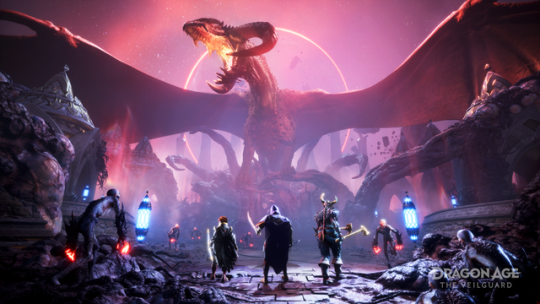
*The following contains spoilers*
“You would risk everything you have in the hope that the future is better? What if it isn’t? What if you wake up to find the future you shaped is worse than what was?”
– Solas, Dragon Age: Inquisition (2014)
I. Whatever It Takes
My premium tickets for a local film festival crumpled and dissolved in my pants pocket, unredeemed as they swirled in the washing machine. Throughout that October weekend in 2015, I neglected my celebratory privileges, my social visits to friends, and even my brutal honors literary theory class. All because a golden opportunity stretched before me: a job opening for a writing position at the once-legendary BioWare, with an impending deadline.
The application process wasn’t like anything I’d seen before. Rather than copy+paste a cover letter and quickly swap out a couple of nouns here and there, this opening required me to demonstrate my proficiency in both words and characters – namely, BioWare’s characters. Fanfiction wasn’t normally in my wheelhouse – at the time, I had taken mainly to spinning love sonnets (with a miserable success rate). But I wouldn’t balk at this chance to work on one of my dream franchises – especially since the job prospects for fresh English BAs weren’t exactly promising. So, I got to work crafting a branching narrative based on the company’s most recent title: Dragon Age: Inquisition. Barely two months prior, I saw the conclusion of that cast’s story when the Inquisitor stabbed a knife into a map and swore to hunt her former ally, Solas, to the ends of the earth. Now it was my turn to puppeteer them, to replicate the distinct voice of each party member and account for how they’d react to the scenario I crafted. And if it went well, then maybe I’d be at the tip of the spear on that hunt for Solas. Finishing the writing sprint left me exhausted, but also proud of my work.
The folks at BioWare obviously felt differently, because I received a rejection letter less than a week later. Maybe they found my story trite and my characterization inaccurate, or maybe they just didn’t want to hire a student with no professional experience to his name. Regardless, I was devastated. It wouldn’t be until years later that I learned that, had my application been accepted, I likely would’ve been drafted into working on the studio’s ill-fated looter shooter, Anthem (2019), noteworthy for its crunch and mismanagement. My serendipitous rejection revealed that sometimes the future you strive to build was never meant to match your dreams. What seemed like an opportunity to strike oil actually turned out to be a catastrophic spill.
Still, my passion for the Dragon Age series (as well as Mass Effect) persisted in the face of BioWare’s apparent decline. I maintain that Inquisition is actually one of the studio’s best games, and my favorite in the series, to the point where I even dressed up as Cole for a convention one time. The game came to me at a very sensitive time in my life, and its themes of faith vs falsehood, the co-opting of movements in history, and the instability of power all spoke to me. But I will elaborate more on that at a later date. My point is, I held on to that hope that, in spite of everything, BioWare could eventually deliver a satisfactory resolution to the cliffhanger from their last title. Or perhaps it was less hope and more of a sunk cost fallacy, as an entire decade passed with nary a peep from Dragon Age.
As years wore on, news gradually surfaced about the troubled development of the fourth game. Beginning under the codename “Joplin” in 2015 with much of the same creative staff as its predecessors, this promising version of the game would be scrapped two years later for not being in line with Electronic Arts’s business model (i.e. not being a live-service scam). Thus, it was restarted as “Morrison”. The project cantered along in this borderline unrecognizable state for a few years until they decided to reorient it back into a single-player RPG, piling even more years of development time onto its shaky Jenga tower of production. Indeed, critical pieces were constantly being pulled out from the foundations during this ten year development cycle. Series regulars like producer Mark Darrah and director Mike Laidlaw made their departures, and the project would go on to have several more directors and producers come and go: Matthew Goldman, Christian Dailey, and Mac Walters, to name a few key figures. They eventually landed on John Epler as creative director, Corinne Busche as game director, and Benoit Houle as director of product development. Then came the massive layoffs of dozens of employees, including series-long writer Mary Kirby, whose work still made it into the final version of DA4. Finally, the game received a rebranding just four months before release, going from Dreadwolf (which it had been known as since 2022) to The Veilguard (2024) – a strange title with an even stranger article.
Needless to say, these production snags did not inspire confidence, especially considering BioWare’s been low on goodwill between a string of flops like Anthem and Mass Effect: Andromeda (2017) and, before that, controversial releases like Dragon Age II (2011) and Mass Effect 3 (2012). The tumult impacted The Veilguard’s shape, which scarcely resembles an RPG anymore, let alone a Dragon Age game. The party size is reduced from four to three, companions can no longer be directly controlled, the game has shifted to a focus on action over tactics a la God of War (2018), the number of available abilities has shrunk, and there’s been a noticeable aesthetic shift towards a more cartoonish style. While I was open to the idea of changing up the combat (the series was never incredible on that front), I can’t get over the sensation that these weren’t changes conceived out of genuine inspiration, but rather vestigial traces from the live-service multiplayer iteration. The digital fossil record implies a lot. Aspects like the tier-based gear system, the instanced and segmented missions, the vapid party approval system, the deficit of World State import options, and the fact that rarely does more than the single mandatory companion have anything unique to say on a quest – it all points to an initial design with a very different structure from your typical single-player RPG. The Veilguard resembles a Sonic Drive-In with a mysterious interior dining area – you can tell it was originally conceived as something else.1
That said, the product itself is functional. It contains fewer bugs than any previous game in the franchise, and maybe BioWare’s entire catalog for that matter. I wouldn’t say the combat soars, but it does glide. There’s a momentum and responsiveness to the battle system that makes it satisfying to pull off combos and takedowns against enemies, especially if you’re juggling multiple foes at once. Monotony sets in after about thirty or forty hours, largely due to the fact that you’re restricted to a single class’s moveset on account of the uncontrollable companions. Still, this design choice can encourage replay value, as it does in Mass Effect, and free respec options and generous skill point allocations offset the tedium somewhat.
While the character and creature designs elicit controversy – both for the exaggerated art direction and, in the case of demons and darkspawn, total redesign – the environmental art is nothing short of breathtaking. I worried that this title would look dated because of how long it had been in development and the age of the technology it was built upon. Those fears were swiftly banished when I saw the cityscapes of Minrathous, the cyclopean architecture of the Nevarran Grand Necropolis, or the overgrown ruins of Arlathan. But like everything in The Veilguard, it’s a double-edged sword. The neon-illuminated streets of Docktown, the floating citadel of the Archon’s Palace, and the whirring mechanisms of the elven ruins evoke a more fantastically futuristic setting that feels at odds with all three previous titles (even though all three exhibited a stylistic shift to some extent). It aggravates the feeling of discordance between this rendition of Thedas and the one returning players know.
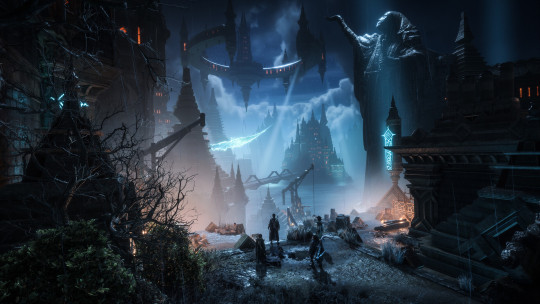
All of these elements make The Veilguard a fine fantasy action-adventure game – even a good one, I’d say. But as both the culmination of fifteen years of storytelling and as a narrative-based roleplaying game – the two most important facets of its identity – it consistently falls short. Dragon Age began as a series with outdated visuals and often obtuse gameplay, but was borne aloft by its worldbuilding, characterization, and dialogue. Now, that paradigm is completely inverted. The more you compare it to the older entries, the more alien it appears. After all these years of anticipation, how did it end up this way? Was this the only path forward?
Throughout The Veilguard’s final act, characters utter the phrase “Whatever it takes,” multiple times. Some might say too many. I feel like this mantra applied to the development cycle. As more struggles mounted, the team made compromise after compromise to allow the game to exist at all, to give the overarching story some conclusion in the face of pressure from corporate shareholders, AAA market expectations, and impatient fans. Whatever it takes to get this product out the door and into people’s homes.
This resulted in a game that was frankensteined together, assembled out of spare parts and broken dreams. It doesn’t live up to either the comedic heights or dramatic gravity of Inquisition’s “Trespasser” DLC from 2015, despite boasting the same lead writer in Trick Weekes. Amid the disappointment, we’re left with an unfortunate ultimatum: It’s either this or nothing.
I don’t mean that as a way to shield The Veilguard from criticism, or to dismiss legitimate complaints as ungrateful gripes. Rather, I’m weighing the value of a disappointing reality vs an idealized fantasy. The “nothing”, in this sense, was the dream I had for the past decade of what a perfect Dragon Age 4 looked like. With the game finally released, every longtime fan has lost their individualized, imaginary perfection in the face of an authentic, imperfect text. Was the destruction of those fantasies a worthy trade? It doesn’t help that the official artbook showcases a separate reality that could’ve been, with a significant portion dedicated to the original concepts for Joplin that are, personally, a lot closer to my ideal vision. I think it would’ve done wonders to ground the game as more Dragon Age-y had they stuck with bringing back legacy characters, such as Cole, Calpernia, Imshael, and the qunari-formerly-known as Sten.
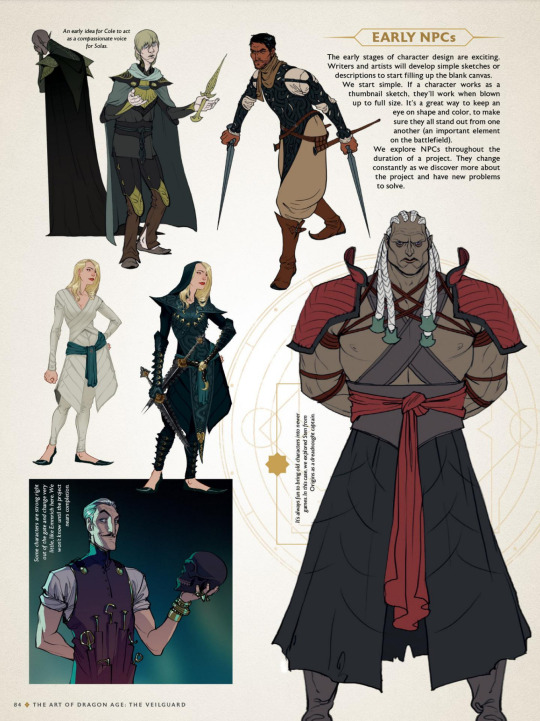
I don’t necessarily hate The Veilguard (I might actually prefer it to Dragon Age II), but I can’t help but notice a pattern in its many problems – a pattern that stems from a lack of faith in the audience and a smothering commitment to safety over boldness. As I examine its narrative and roleplaying nuances, I wish to avoid comparing it to groundbreaking RPGs such as Baldur’s Gate 3 (2023) or even Dragon Age: Origins (2009), as the series has long been diverging from that type of old-school CRPG. Rather, except when absolutely necessary, I will only qualitatively compare it to Inquisition, its closest relative.
And nowhere does it come up shorter to Inquisition than in the agency (or lack thereof) bestowed to the player to influence their character and World State.
II. Damnatio Memoriae
No, that’s not the name of an Antivan Crow (though I wouldn’t blame you for thinking so, since we have a character named “Lucanis Dellamorte”). It’s a Latin phrase meaning “condemnation of memory”, applied to a reviled person by destroying records of their existence and defacing objects of their legacy. In this case, it refers to the player. When it comes to their influence over the world and their in-game avatar, The Veilguard deigns to limit or outright eliminate it.
Save transfers that allow for the transmission of World States (the carrying over of choices from the previous games) have been a staple of the Dragon Age and Mass Effect franchises. Even when their consequences are slight, the psychological effect that this personalization has on players is profound, and one of many reasons why fans grow so attached to the characters and world. At its core, it’s an illusion, but one that’s of similar importance to the illusion that an arbitrary collection of 1s and 0s can create an entire digital world. Player co-authorship guarantees a level of emotional investment that eclipses pre-built backgrounds.
However, The Veilguard limits the scope to just three choices, a dramatic decrease from the former standard. All import options come from Inquisition, with two just from the “Trespasser” expansion. One variable potentially impacts the ending, while the other two, in most cases, add one or two lines of dialogue and a single codex entry. Inquisition, by contrast, imported a bevy of choices from both previous games. Some of them had major consequences to quests such as “Here Lies the Abyss” and “The Final Piece”, both of which incorporated data from two games prior. The Veilguard is decidedly less ambitious. Conspicuously absent options include: whether Morrigan has a child or not, the fate of Hawke, the status of the Hero of Fereldan, the current monarchs of Fereldan and Orlais, the current Divine of the southern Chantry, and the individual outcomes of more than two dozen beloved party members across the series. Consequently, the fourth installment awkwardly writes around these subjects – Varric avoids mentioning his best friend, Hawke, as does Isabela ignore her potential lover. Fereldan, Orlais, and the Chantry are headed by Nobody in Particular. Morrigan, a prominent figure in the latest game, makes no mention of her potential son or even her former traveling companions. And the absence of many previous heroes, even ones with personal stakes in the story, feels palpably unnatural. I suspect this flattening of World States into a uniform mold served, in addition to cutting costs, to create parity between multiple cooperative players during the initial live-service version of Morrison. Again, the compromises of the troubled production become apparent, except this time, they’re taking a bite out of the core narrative.
Moreover, the game’s unwillingness to acknowledge quantum character states means that it’s obliged to omit several important cast members. At this point, I would’ve rather had them establish an official canon for the series rather than leaving everything as nebulous and undefined as possible. That way at least the world would’ve felt more alive, and we could’ve gotten more action out of relevant figures like Cassandra, Alistair, Fenris, Merrill, Cole, and Iron Bull. Not to mention that The Veilguard’s half-measure of respectful non-intereference in past World States ultimately fails. Certain conversations unintentionally canonize specific events, including references to Thom Rainier and Sera, both of whom could go unrecruited in Inquisition, as well as Morrigan’s transformation into a dragon in the battle with Corypheus in that game’s finale. But whatever personal history the player had with them doesn’t matter. The entire Dragon Age setting now drifts in a sea of ambiguity, its history obfuscated. It feels as gray and purgatorial as Solas’s prison for the gods.
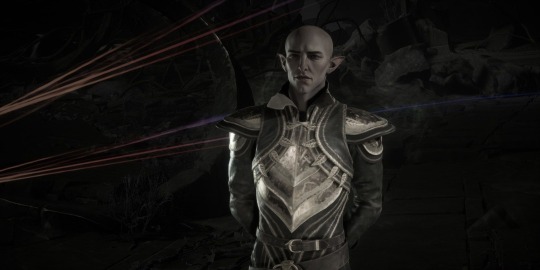
Beyond obscuring the past, The Veilguard restrains the player’s agency over the present. When publications first announced that the game would allow audiences to roleplay transgender identities and have that acknowledged by the party, I grew very excited – both at the encouraging representation, and at the depth of roleplaying mechanics that such an inclusion suggested. Unfortunately, The Veilguard offers little in roleplaying beyond this. The player character, Rook, always manifests as an altruistic, determined, friendly hero, no matter what the player chooses (if they’re offered choices at all). The selections of gender identity and romantic partner constitute the totality of how Rook defines themselves, post-character creation – exceptions that prove the rule of vacancy. Everything else is set in stone. The options presented are good, and should remain as standard, but in the absence of other substantive roleplaying experiences, their inclusion starts to feel frustratingly disingenuous and hollow, as if they were the only aspects the developers were willing to implement, and only out of obligation to meet the bare minimum for player agency. In my opinion, it sours the feature and exudes a miasma of cynicism.
Actual decisions that impact the plot are few and far between, but at least we have plenty of dialogue trees. In this type of game, dialogue options might usually lead to diverging paths that eventually converge to progress the plot. You might be choosing between three different flavors of saying “yes”, but as with the World States, that illusion of agency is imperative for the roleplaying experience. The Veilguard doesn’t even give you the three flavors – the encouraging, humorous, and stern dialogue options are frequently interchangeable, and rarely does it ever feel like the player is allowed to influence Rook’s reactions. Relationships with companions feel predetermined, as the approval system has no bearing on your interactions anymore. There are so few moments for you to ask your companions questions and dig in deep compared to Inquisition. Combined together, these issues make me question why we even have dialogue with our party at all. Rook adopts the same parental affect with each grown adult under their command, and it feels like every conversation ends the same way irrespective of the player’s input. With the exception of the flirting opportunities, they might as well be non-interactive cutscenes.
Rook’s weak characterization drags the game down significantly. With such limited authorship afforded to the player, it’s difficult to regard them as anything more than their eponymous chess piece – a straightfoward tool, locked on a grid, and moving flatly along the surface as directed.
III. Dull in Docktown
On paper, a plot summary of The Veilguard sounds somewhere between serviceable and phenomenal: Rook and Varric track down Solas to stop him from tearing down the Veil and destroying the world. In the process, they accidentally unleash Elgar’nan and Ghilan’nain, two of the wicked Evanuris who once ruled over the elven people millenia ago. With Solas advising them from an astral prison, Rook gathers a party together to defeat the risen gods, along with their servants and sycophants. Over the course of the adventure, they uncover dark truths about the origins of the elves, the mysterious Titans, and the malevolent Blight that’s served as an overarching antagonistic force. Eventually, Rook and friends join forces with Morrigan and the Inquisitor, rally armies to face off with their foes, and slay both the gods and their Archdemon thralls before they can conjure the full terror of the Blight. As Solas once again betrays the group, Rook and company have to put a decisive stop to his plans, which could potentially involve finally showing him the error of his ways.
The bones of The Veilguard’s story are sturdier than a calcium golem. Problems arise when you look at the actual writing, dialogue, and characterization – the flesh, blood, and organs of the work.
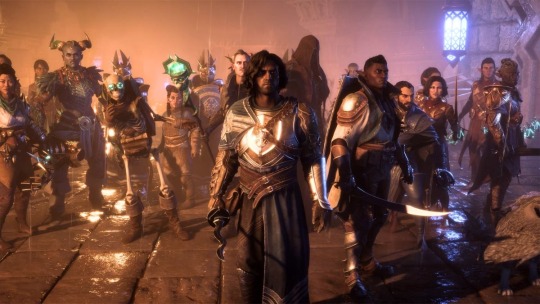
I’ve seen others chide the writing as overly quippy, but that better describes previous titles. Rather, I think The Veilguard’s dialogue is excessively utilitarian and preliminary, like a first draft awaiting refinement. Characters describe precisely what’s happening on screen as it’s happening, dryly exposit upon present circumstances, and repeat the same information ad nauseum. This infuriating repetition does little to reveal hidden components of their personalities, or their unique responses to situations. You won’t hear anything like Cole’s cerebral magnetic poetry or Vivienne’s dismissive arrogance. Many exchanges could’ve been uttered by Nobody in Particular, as it’s just dry recitation after recitation. It almost feels like watching an English second language instructional video, or a demonstration on workplace safety precautions. Clarity and coherence come at the cost of characterization and charisma.
Words alone fail to make them interesting. Most companions lack the subtlety and depth I had come to expect from the franchise, with many conversations amounting to them just plainly stating how they’re feeling. Most rap sessions sound like they’re happening in a therapist’s office with how gentle, open, and uncomplicated they feel. Compare this to Inquisition, where every character has a distinct voice (I should know, I had to try to copy them for that stupid application), as well as their own personal demons that it betrays: Sera’s internalized racism, hints of Blackwall’s stolen valor, Iron Bull’s espionage masked by bluster, or Solas’s lingering guilt and yearning for a bygone age. These aspects of their characters aren’t front and center, but things the audience can delve into that gives every moment with them more texture. The Veilguard’s companions lay out all their baggage carefullly and respectfully upfront, whether it’s Taash’s multiculturalism and gender identity issues or Neve’s brooding cynicism towards Tevinter’s underbelly. You’ve plumbed the depths of their personas within the first few minutes of meeting most of them.
Small exceptions exist. Professor Emmerich Volkarin stands out from the rest of the cast as a particularly inspired character: a charming, Vincent Price-like necromancer. His attachment to tombs and necromancy as a way to cope with his crippling fear of death makes for curiously compelling melodrama. The way in which he ultimately has to face his fear – either by foregoing his opportunity for immortality to save his beloved skeletal ward, Manfred, or by allowing his friend to pass on so that he can transcend into a new type existence – rises above the other binary choices in the game by being both narratively interesting and legitimately difficult to judge. Still, I feel Emmerich’s whole “lawful good gentleman necromancer” conceit, while a unique and clever subversion of tropes, would’ve worked better if it actually contrasted with anyone else in the party. Instead, the whole crew is full of unproblematic do-gooders who are forbidden by the game to nurture any meaningful interpersonal conflict. While I’d appreciate this lack of toxicity in my real-life relationships, fictional chemistry demands more reactive ingredients.

The Veilguard’s developers frequently positioned the game as “cozy” and about a “found family”, but I can guarantee you that there’s more tension at my Thanksgiving dinners than there is anywhere in this title. This family would get along swimmingly even during a presidential election. The thing about the “found family” trope is that it’s more satisfying when it’s earned. Here, it represents the default state, the starting point, and the status quo that they will always return to. Any minor squabbles (Harding wanting to sleep in the dirt, Emmerich taking too many books on a camping trip, Taash not liking necromancy) are introduced and squashed within the same scene. They all feel so extraneous. There’s so little friction among the companions here that you’d think it disproves Newton’s Third Law. The previous games never struggled in this regard, which makes the choices here all the more baffling.
Beyond the intra-party dynamics, characters lack grit or darkness to them – even when the narrative absolutely calls for it. Remember how I described the necromancer as lawful good (to use traditional Dungeons and Dragons alignments)? Yeah, that’s every character. Even the demonic assassin. Lucanis is a notorious hitman possessed by a demon of Spite, and possibly the weakest character of the game. This may or may not be due to the fact that his writer, Mary Kirby, was laid off mid-development. Regardless, he has noticeably less content than the other party members and generally feels unfinished. The demonic possession storyline goes nowhere; he doesn’t exorcise Spite, nor does he learn more about it or how to live with it. Instead, Spite is just an excuse to give Lucanis cool spectral wings (which he will use to fail several assassination attempts). The demon itself mostly just comes across as rude rather than threatening. The biggest issue, however, stems from the absence of any edge to Lucanis. When confronting his traitorous cousin, Ilario – the man who sold out Lucanis’s family to an enemy faction, kidnapped his grandmother, and made multiple attempts on his life – our grizzled, hardened assassin, pushed to the brink, demands… due process. Seriously, if your choices have led Lucanis to have a hardened heart, his method for dealing with the grievous traitor is sending him to jail. That’s The Veilguard’s idea of vindictive brutality among a clan of unforgiving murderers-for-hire. By contrast, Inquisition features Sera insubordinately murdering a stuck-up nobleman for talking too much. I believe that if modern BioWare had written The Godfather (1972), it would’ve ended with Michael Corleone recommending his brother-in-law to attend confession and seek a marriage counselor.
The writers seem intent on making the cast wholly unproblematic, with no way that the audience could ever question their morality or taste the delicious nuance of seeing someone you like do something bad. Measures were taken to child-proof every aspect of the good guys so that they couldn’t possibly be construed as anything else – even if it constricts them to the point of numbness and eventual atrophy.
To make things as palatable and accessible as possible, the language itself was dumbed down. Characters make frequent use of neologisms and bark phrases like “Suit up,” or “These guys go hard.” It emulates popular blockbuster superhero stuff rather than staying true to the diction the series traditionally employed. It’s all about the team, and the entire Dragon Age world has been stripped down into simplistic conflicts and recognizable stock characters.
This is why The Veilguard’s story largely fails. Despite being ostensibly being about the characters, they come off as an afterthought. Most of the time, only the sole requisite follower has anything to say on a given mission. Even in combat, their wholeness as fully-implemented party members falls short of expectations. Their damage output pales in comparison to the Rook’s, they have no health and cannot be downed in battle, and they mainly exist to give the player three extra ability slots. That’s the game’s true ethos for the companions, whether in combat or dialogue – utility, tools to make things happen rather than elegantly crafted identities. We end up with the largest amount of content per companion among any game in the franchise, only to have the weakest roster.
I know these writers can do better, because I’ve seen them do better. Trick Weekes wrote Iron Bull, Cole, and Solas in Inquisition, as well as Mordin Solus and Tali’Zorah in Mass Effect 2 (2010) and Mass Effect 3. Mary Kirby wrote Varric throughout the series, as well as Sten and Loghain in Origins. Plenty of other experienced writers, such as Sylvia Feketekuty and John Dombrow also contributed, so I can’t put any of the blame on a lack of skill. I don’t know if the mistake was trying to appeal to a wider audience, or if the constant reorientations of the DA4 project drained the crew’s passion and left them lacking in time to polish things.
I personally suspect that the writers had to rush out a script for all of the voiced dialogue. A video from August of 2020 showed off the voice actors for Davrin and Bellara, more than four years before the final game’s release. I think the codex entries, letters, and missives that you find throughout the game, which consist of only text, are much better written than the dialogue. My theory is that the writers had more time to revise and spruce up these tidbits, where edits were minimally invasive, as far as production is concerned. But my knowledge is limited; after all, BioWare rejected my application almost a decade ago.
Still, there are aspects of The Veilguard’s plot that I enjoy. The lore reveals were particularly satisfying2, and many felt rewarding after a decade of speculation. I called that elves were originally spirits, as well as the connection between the Archdemons and the Evanuris, but I wouldn’t have guessed that the Blight formed out of the smoldering rage of the Titans’ severed dreams. I’d concisely describe The Veilguard’s story as the opposite of Mass Effect 3: Whereas ME3 did excellent character work, the characterization in The Veilguard leaves much to be desired. Whereas ME3’s tone was overwhelmingly grim, The Veilguard feels inappropriately positive. Whereas ME3’s lore reveals ruined much about the series’s mystique, The Veilguard’s helped tie the setting’s history together. And whereas ME3 fumbled the ending about as much as it possibly could, The Veilguard actually coalesces into a spectacular third act.
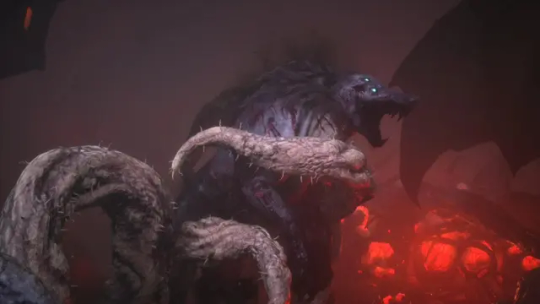
While I think the twist with Varric’s death is weak (outright pitiful compared to the Dread Wolf twist of Inquisition), the actual events that make up the finale carry a momentum and urgency that the rest of the game severely lacked. Everything from the sacrifice and kidnapping of Rook’s companions to the slaying of Ghilan’nain to the awe-inspiring battle between the Dread Wolf and Archdemon Lusacan – the whole affair takes the best parts of Mass Effect 2’s Suicide Mission and elevates it to the scale of an apocalyptic series finale. Ultimately, Solas takes center stage as the final antagonist, and the drama crescendos to a height the rest of the game desperately needed. He remains the most interesting character in the game and perhaps the franchise, and thankfully, the resolution to his story did not disappoint me (though I would’ve preferred the option for a boss battle against his Dread Wolf form if the player’s negotiations broke down). So in that sense, I think the worst possible scenario was avoided.
But is that really worth celebrating? Averting complete disaster? Exceeding the lowest standards? In many regards, The Veilguard still could have been – should have been – more.
IV. A World of Tranquil
In my essay on Final Fantasy VII: Rebirth (2024), I briefly discussed a trend in media to sand off the edges so as not to upset the audience in any way. The encroachment of this media sanitization seems to be an over-correction to the brimming grimness of late 2000s and early 2010s fiction (to which the first two Dragon Age titles belong), which earned comparable levels of criticism. Like Solas, I occasionally feel trapped in a cycle of regret, where it feels like our previous yearning for less aggressive, mean-spirited content led to a media landscape that prioritized patronizingly positive art. Now it’s clear to me that, in order to have a point, you need to have an edge.
Dragon Age historically drew a very progressive audience, and many of them congregated around Tumblr in that website’s heyday. Tumblr has garnered something of a reputation for overzealous discourse and sensitivity among its userbase, and I think that the developers of The Veilguard, in an attempt to cater to one of their core audiences, may have misunderstood both that passion and the fundamental appeal of their products. They became so concerned about optics, about avoiding politically charged criticism, that they kneecapped their world-building, rendering it as inoffensive and sterile as possible. It’s not so much “PC culture” as it is “PG culture.”
To that end, the various governments, factions, and societies of Thedas lost their edge. Dragon Age previously presented itself as anti-authoritarian by showcasing the rampant abuses of power across all cultures. Whether it was the incarceration of mages under the Chantry, the slavery practiced by the Tevinter Imperium, the expansionist anti-individualism of the Qun, the restrictive dwarven caste system, or the rampant racism against elves, social strife abounded in this world. I think that’s one thing that drew so many marginalized fans to the series. But the correlation of fictional atrocities with those of real life frequently prompted volatile discourse, with many concerned about how allegedly allegorized groups were being represented. You began to see countless essays pop up by folks who use the phrase “blood quantum” more than any healthy person should for a setting about wizards. BioWare responded to this by making Thedosian society wholly pleasant and the people in power responsible and cool and the disparate cultures tolerant and cooperative. If nothing’s portrayed negatively (outside of the cartoonishly evil gods), nobody can take offense, right?
For starters, the Antivan Crows have gone from an amoral group of assassins to basically Batman. These figures, which previously purchased children off slave markets to train them into killers, are now the “true rulers” of Antiva, by which the official government derives its authority. The Crows in The Veilguard stand against the insurgent qunari army as heroes of the common folk. They’re not an unscrupulous faction that Rook is reluctantly forced to ally with for the greater good; no, the Crows are simply good guys now. When the pompous governor of Treviso rails against them, with such audacious claims as “assassins and thugs should not represent the citizenry,” we’re meant to laugh at the governor’s foolishness. The unintentional implication this sends is that lethal vigilantism and unchecked power are cool because the people who use it are cool and stylish. The slave trade goes unacknoweldged; Antivan children want to grow up to be assassins now. The Crows never do anything wrong in The Veilguard – the governor is later revealed to be cooperating with the invaders for their own power. BioWare avoids the unpleasantness inherent in the Crows’ concept by pretending it never existed.
Perhaps more ridiculous is the Lords of Fortune, a new faction of pirates and treasure hunters based out of Rivain. Except they don’t really do piracy or treasure hunting. The game goes to lengths to ensure that the audience knows that the Lords don’t steal important cultural artifacts from any of the tombs and ruins they raid. What do they steal, then? There is no such thing as an ethical treasure hunter – plundering indigenous sites for souvenirs is inherently problematic – but the writers wanted to reap the appeal of adventurous swashbucklers without any of the baggage, regardless of whether it makes sense or not3. It comes across as a child’s idea of a pirate: they’re not thinking about the murder and looting, just the funny men with eye-patches who say “ARRR!” The developers want us to like the Lords of Fortune, and to that end, they can’t do anything culturally insensitive – even fictional disrespect toward a made-up culture. This is doubly amusing because the Lords are represented by Isabela from Dragon Age II. The same Isabela that kicked off a war with the qunari by stealing their holy book, the Tome of Koslun. This irony goes unacknowledged by the game.4
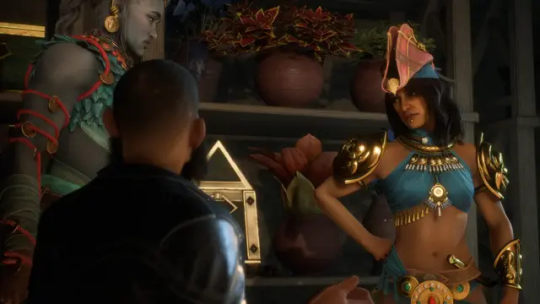
When these rogue buccaneers aren’t busy giving land acknowledgments to displaced Dalish elves or whatever, they’re enjoying their nonviolent coliseum. Pirates revel in bloodsport, but only so long as no actual blood is spilled. The Lords refuse to fight prisoners or animals in their arena, as they find such acts too cruel. I guess they’re all big Peter Singer readers. Instead, they summon spirits to adopt the visages of common enemies so that the player can kill them with a clean conscience. It’s another example of wanting to have your cake and eat it too – they wanted to create a glory hunter/gladiator faction, but couldn’t stand the underlying implications of such. So they twisted and bent them to fit into their unproblematic paradigm, leaving the Lords flavorless and lame. They barely even contribute to the main story, and they’re practically the only look we get into Rivaini society (which remains criminally underdeveloped).
More tragic is the handling of the qunari, once one of the most unique and nuanced civilizations in the Dragon Age setting. The Qun, as portrayed in the first three installments, is a society that demands all of its composite parts work in harmony. Thus, they have predetermined vocations for their children, rigid gender roles, strict codes of conduct, and an ambition to “enlighten” the rest of the world. While the Qun has often been presented as antagonistic toward the heroes, the series has commonly balanced its portrayal by showing how seductive its absolutism can be for people without hope. In some cases, life under the Qun is preferable, as is the case with former Tevinter slaves. Conformity becomes comfort when the world is regularly threatening to split apart.
The Veilguard opts for a different approach. See, Rook’s not fighting members of the Qun in this game – they’re fighting the Antaam, the former qunari military. The Veilguard constantly reiterates that the Antaam, which makes up one of the three branches of the Qun, has broken off and decided to invade, pillage, and stoke chaos. BioWare didn’t want the questionable morality and complexity of fighting an invading people from a humanized, multi-faceted culture, so they removed their culture. Their efforts to turn the non-Western-coded qunari into something digestible for their mistaken conception of a modern audience instead results in two caricatures: one being a fetishized, perfect society where there are no perceivable social ills; and the other a bunch of rampaging brutes.
Contending with a realized conception of Plato’s Republic mixed with the Ottoman Empire makes for more compelling drama than a horde of murderous giants. Again, BioWare wanted to have it both ways, and they still needed nameless, faceless orcs to kill. So every bit about the qunari’s militancy, imperialism, and repression coexisting alongside some of their more progressive ideas and communal unity is stripped of its context and meaning. Blame is placed solely on the Antaam, who no longer represent (and retroactively, never represented) the Qun’s ideology. It’s a cowardly compromise, attempting to pin the blame of all the Qun’s failings on a renegade military and seeking to exonerate the political and social apparatuses of their culpability.
At one point, a minor character named Seer Rowan lectures to an ignorant human (a proxy for the audience absorbing these retcons) that qunari society has always been egalitarian in practice, with mages enjoying freedom there. Previous games showed that the qunari shackle their “saarebas” mages, stitch their mouths, cut out their tongues, and teach them to commit suicide if they ever stray from their masters. However, we’re now assured that this is only practiced under the Antaam, and No True Qunari would ever do such a thing. Ignore the fact that, in Inquisition, we witness the enslaved saarebas under the supervision of the Ben-Hasserath, a subdivision of the Ariqun (i.e. not part of the Antaam). In fact, the Antaam that Rook fights in The Veilguard never command saarebas at all. They’re completely absent from the game (likely because the image of the bound, mutilated minority was too much for The Veilguard’s sensibilities). Seer Rowan’s weak, conciliatory retcon can’t even justify itself in its own game. The scolding diatribe communicates an intrinsic misunderstanding of the Qun by the writers – namely, it continues the pattern established with the Antivan Crows that the mechanics of power in society are fundamentally good as long as aberrant forces aren’t in charge. While I understand the desire to be conscientious about the portrayal of fictional cultures that draw upon non-Western traditions and iconography (which have historically been demonized in media), glamorizing the Qun and stripping it of its realistic nuance does little to alleviate any problems with representation. If anything, it creates new ones.
But hey, now we have our faceless orcs to guiltlessly slaughter. That’s what the Antaam’s been reduced to, bereft of the ideology that made them people. We kill them because they’re strange and scary and foreign and seeking to destroy our cities for fun. They remain the most prominent representation of the qunari in-game, barring our party member Taash. BioWare’s attempts to reverse what they viewed as problematic components to the qunari instead devolved into the very tropes they wished to avoid.
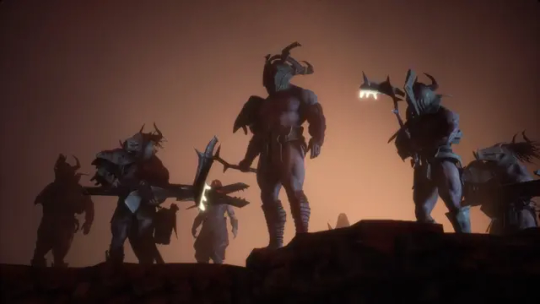
Which leads us to the elves. Much of the series’s discourse has surrounded the portrayal of the long-suffering elven people, who endure slavery under Tevinter, expulsion from their homeland in the Dales, confinement in ghettos, and the general disdain from other races. The games’ stories use symbolic shorthand of real-life oppressed peoples to communicate these tragedies, and this has led to a variety of intense, emotional interpretations over the years. The unending misery of the systematically marginalized elves hasn’t gone unnoticed by the fanbase – and their criticisms haven’t gone unnoticed by the developers. To quote The Veilguard’s creative director, John Epler, in an interview with Polygon:
“Dragon Age has not always been the kindest to the Dalish [elves]. Somebody once made a joke to me, and it’s not untrue, that it’s possible to wipe out a Dalish clan in all three of the games in some way.”
He and others on the development team must’ve thought elves needed a break, because the omnipresent racism against them vanishes completely in The Veilguard. Tevinter, an empire built on the back of chattel slavery, doesn’t show any of that. Consequently, it feels like players in the know still haven’t seen the true face of Tevinter, despite spending half a game there. The notion that the capital of Minrathous gives now is one of a prosperous city that’s centuries ahead of the countries down south, rather than a cruel regime cracking the whip at every opportunity. Perhaps the writers weren’t comfortable portraying this, or felt that their audience might not be amenable to it after years of incendiary argumentation. Nevertheless, it castrates their established world-building and robs us of the opportunity to witness true elven liberation in the climax. With both the fall of Minrathous and the toppling of the tyrannical elven gods, we could have delivered a much needed catharsis after four games of oppression, but The Veilguard forgoes this storytelling opportunity to play it safe.
I worry that this hesitancy originated from anxieties about the sensitivity of depicting marginalized peoples in brutal, dehumanizing conditions, and how that might look to more fragile viewers. But I think it’s important for all players, watchers, and readers to know that, though there might be aspects shared between them, fictional minorities are distinct from real ones.
Dragon Age’s elves are aesthetically Celtic. Their residency in alienages evokes images of Disapora Jews in Europe. Their Long Walk after being driven from the Dales calls back to the Trail of Tears, sharing an experience with Native Americans. Their subsequent migratory nature is reminiscent of the Romani people. And their ancient empire of Arlathan, with its large columns and temples of worship, headed by ascended humanoid (for lack of a better term) deities that cast down an enemy called the Titans, and which has since had its religion and culture co-opted and renamed by Roman-inspired Tevinter invites comparisons to classical Greece.
My point is, the elves of Dragon Age don’t represent one group of people, because fictional cultures are constructs drawing from countless inspirations. If they represent anything beyond themselves, it’s the idea of a proud people that’s fallen under the yoke of conquering powers – a supervictim to embody all. The idea that one must be limited in their storytelling options based on how the portrayal might reflect upon or disrespect an existing culture is flawed, in my opinion. In the overwhelming majority of cases, coding cannot be read as a 1:1 allegory, especially in speculative fiction like science-fiction and fantasy. I believe the most mature way to evaluate a story isn’t to try to pigeonhole what it’s trying to say say about who, as if there’s some insidious encrypted message in the text. Rather, it’s to see the forest through the trees and interpret the work as a complete whole in itself.
On that basis, I ask: would it have been so bad to see some of those enslaved elves, praying for salvation, side with their manipulative, nefarious gods? To add some nuance to the conflict with Elgar’nan and Ghilan’nain, would the story of elven liberation not have been better if the game actually engaged with it? Could we actually have a moral quandary with those whom Rook ends up fighting, even if the content might be seemingly problematic?
Epler might respond in the negative, per the Polygon interview, claiming that the gods “simply don’t care” about the elves.
“Those blighted, decrepit gods, they’re not bothering with the soft pitch. Their pitch is, We’re going to make a horrible world. We’re going to give you a lot of power, and maybe you’ll be OK.”
Like a chess board, the core conflict of The Veilguard is black and white. BioWare abandoned the chance to make Elgar’nan and Ghilan’nain more interesting villains because it was too risky.
Similarly risky was Solas’s role as an antagonist, since his motivations, as explained in “Trespasser”, are deeply sympathetic. Perhaps too much so for the developers’ comfort. Unlike the Evanuris and their disinterest in the elves, Solas wants to restore the elven people to their former glory. At least, that seemed to be his pitch in the last game. Frustratingly absent from The Veilguard are the Agents of Fen’Harel – elves who swore fealty to Solas’s cause. They infiltrated and compromised the Inquisition, effectively precipitating the final decision to end the organization in its current form. The idea that Solas had amassed an army of common folk who found the idea of a renewed elven empire appealing made him appear formidable and intimidating. “Trespasser” implies that a mass uprising of elves under Solas’s leadership was imminent, and anyone could be in on it.
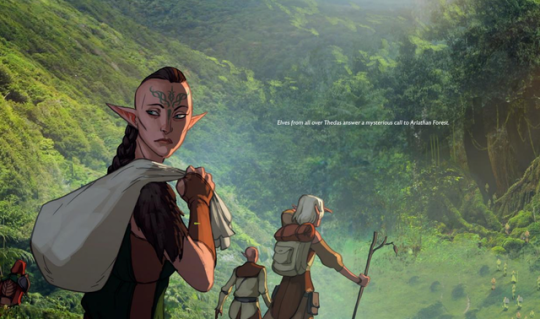
None of this happens in The Veilguard. Not only does Solas lack an army, but their absence isn’t explained or even acknowledged. As a result, Solas remains a passive antagonist until near the end, since the player has no disciples of his to contend with (either physically or ideologically) along the way. It wastes a side of his character that had been foreshadowed in a decade-long cliffhanger – that of a charismatic leader, capable of coordinating a rebellion that could spell disaster for its own followers.
In a Reddit AMA after the latest game’s release, Epler answered where the Agents of Fen’Harel disappeared to:
“Solas’ experience leading the rebellion against the Evanuris turned him against the idea of being a leader. You see it in the memories – the entire experience of being in charge ate at him and, ultimately, convinced him he needed to do this on his own. And his own motivations were very different from the motivations of those who wanted to follow him – he had no real regard for their lives or their goals. So at some point between Trespasser and DATV, he severed that connection with his ‘followers’ and went back to being a lone wolf. There are Dalish clans who are sympathetic to his goals, but even there, there’s an understanding that he’s too dangerous to have a more formal connection with, and that he will, ultimately, sacrifice them to his own ends if necessary.”
I find this explanation unsatisfying, not the least bit because the narrative offers next to nothing to imply this. The disappearance of Solas’s agents represents my biggest bugbear with the game, depriving it of the full potential of its highly anticipated antagonist in favor of the more generically villainous Evanuris. Moreover, this omission fits into the aggravating blueprint for The Veilguard’s inoffensive direction. The motivations, emotions, and backgrounds of the Agents of Fen’Harel would be sympathetic, and therefore might problematize the otherwise cut-and-dry conflicts. Epler seemed concerned that audiences might think Solas was “a little too sympathetic in his goals,” according to an interview with GamesRadar+.
But that’s the thing: sympathy isn’t endorsement, and portrayal of sympathetic characters isn’t endorsement either. But neither does that invalidate the emotions and experiences that generate that sympathy, even if the character’s actions ultimately turn toward evil. I’ve noticed a trend (especially in symptomatic criticism, which I generally dislike5) to view art as propaganda, and to evaluate it from a moralizing, top-down perspective. Antagonists with complex or understandable motivations (in this case, revolutionary villains) are often judged by this framework as tools for stories wishing to champion the status quo. Common arguments that I’ve seen imply that the relatability that we often find in villains is not a strength of the writing, but a devilish trick of ideology by which writers can reinforce conservative doctrine, to scold us away from certain beliefs. Any decent writer knows this isn’t the case, and that people don’t write morally or emotionally complex antagonists for didactic purposes. Instead, characters such as these embody the anxieties of their creators – the fear of losing yourself to your passions, the fear of going about things the wrong way, the fear of sacrificing too much to achieve your desired ends. The concepts and feelings that compel these characters remain authentic to the writer’s heart and the connection they established with the audience.
Art isn’t propaganda. To read it as such reduces it and promotes intellectual dishonesty and foolhardy myopia. Stories are irreducible (otherwise, we would not waste our time with them), and so I believe interpretations should be formed from the bottom-up, rooted in the text as much as possible. The “message” cannot be imposed from the top-down, but symptomatic readings, in their focus on tropes and cultural context, frequently condemn without a trial. Hindering your story in order to future-proof it for the sake of optics is a safeguard against this, and one that leads to bad stories. Artists should have confidence that their text will hold its ground on its own. To quote Ursula K. Le Guin’s essay “A Message about Messages”:
“The complex meanings of a serious story or novel can be understood only by participation in the language of the story itself. To translate them into a message or reduce them to a sermon distorts, betrays, and destroys them… Any reduction of that language into intellectual messages is radically, destructively incomplete.” (67-68)
BioWare’s doctrine of passive writing violates this wisdom by surrendering to their fear of (bad) criticism. The Veilguard lacks punch, stakes, and empathy and becomes incongruous with its established lore because it’s not willing to take risks that might alienate or upset players. They’re more concerned with making sure their work is inoffensive than they are with conveying a moving story.
I believe all of this was inherited from an incestuous feedback loop between a vocal minority of critics, of which I might’ve once counted myself among the blameworthy, and the apprehensiveness of out-of-touch corporate board room decision-making. Dragon Age’s genome mutated, and it slowly lost its teeth.
Over the course of a decade, we bred the Dread Wolf into a Dread Pug.
V. What It Took
The Veilguard’s lack of confidence in itself and lack of faith in its audience contribute to its capitulatory nature. In many respects, it feels like the developers lost their passion for it over the course of the ten year hellish production and just wanted to be done with it. This resulted in a decent game that nonetheless feels divorced from what came before it. It tries to juggle being a soft reboot while also trying to close out the series’s biggest and longest running story arcs, but inevitably fumbles.
Nearly everything done by The Veilguard was handled better by Inquisition. And Inquisition was certainly the more ambitious title. Perhaps more returning characters would have established a sense of continuity between the two, or at least made it less awkward by having them present for the story’s grand finale. For as strong as the endgame is, it could’ve benefited from the presence of slave liberator Fenris, elven history aficionado Merrill, possible Evanuris soul vessel Sera, or Divine Victoria (any of them). The core pillar of Dragon Age is the characters, and The Veilguard’s under-performance (and in some cases, outright dismissal) in that regard sabotages its integrity. Without this to anchor it, the changes to gameplay, visuals, and roleplaying depth become more alienating.
Personally, what do I take away from this? The Veilguard is far from the game I dreamed about for ten years, and not the one that loyal fans deserved either. I’m no stranger to disappointment at this point in my life, and yet this still leaves me with a hollow feeling. Will I still be able to return to Inquisition, a game I truly adore, and see it the same way as before, knowing now where all this is leading? The true cost of The Veilguard, for me, has nothing to do with the price tag: it’s the loss of that perfectly tailored dream, now that the possibilities of the future have shut their gates.
Where do those dreams go? Are they doomed to fester in their lonely, incommunicable agony? Will they be twisted by their enmity, like the blighted dreams of the Titans, and spread their corruption into those important happy memories?
In 2014, I was depressed as fuck, and Dragon Age: Inquisition helped me to see the light and come out of it. In 2024, I was depressed as fuck, and Dragon Age: The Veilguard made me feel nothing. There’s no less favorable comparison in my eyes. It’s disheartening to behold something that once meant so much to me and be greeted with numbness. I have to wonder if that affection will ever return, or if I’ve just grown out of it.
But as I wandered the streets of Minrathous as Rook, I heard a familiar song. It was one of the tavern songs from Inquisition, its nostalgic chords filling me with wistful sentiment. I know, deep down, there’s still something there. Maybe I just need to dig it up. Maybe it’s time to look back…
To be continued…
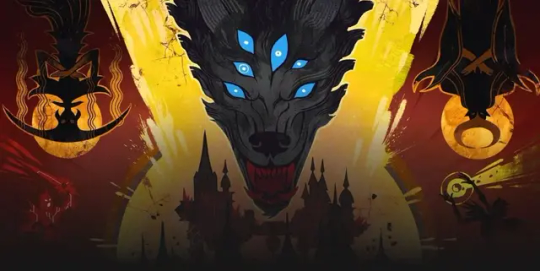
– Hunter Galbraith
Further Reading
Le Guin, Ursula K. “A Message about Messages.” Wonderbook: The Illustrated Guide to Creating Imaginative Fiction, Abrams Image, 2018, pp. 67–68.
Incidentally, this was an anomaly my friends and I pondered over and eventually solved. It turned out to be a former Wienerschnitzel. ↩︎
You could argue that this credit goes more to Inquisition and the previous games for laying the groundwork for said reveals, which were obviously planned out ahead of time, as confirmed by the aforementioned official artbook. Regardless, the payoff satisfied me and gave me proper closure. ↩︎
I’ve been informed that there is a hidden conversation that explains that the Lords of Fortune do, in fact, sell cultural artifacts at times, but only to the rightful owners. This just makes me wonder what they do with the artifacts if the prospective clients can’t pay. Do they shove them back in the ruins and re-arm all the booby traps? ↩︎
I would argue that this does not represent character progression on Isabela’s part, as her (possible, depending on the player’s choices) return of the Tome of Koslun in Dragon Age II was a pragmatic sacrifice she made to save her friends and the city, rather than an acknowledgment of the qunari’s inviolable ownership. In fact, in many continuities, she never returns the Tome at all. ↩︎
I prefer more formalist criticism because it allows the text to lead the dance, not the critique. I think it’s only fair, given that the creators likely spent more effort crafting the piece than I spent consuming it. Symptomatic criticism mandates that the reader consider everything around the text, typically at the text’s expense. In the worst cases, symptomatic critics make their arguments about seemingly everything besides the text in question. ↩︎ Link to article: https://planckstorytime.wordpress.com/2025/01/01/dragon-age-the-veilguard-strangled-by-gentle-hands/
#planckstorytime#writing#analysis#essay#dragon age#datv spoilers#datv rook#dragon age veilguard#veilguard#dragon age inquisition#solas#lace harding#bellara lutare#davrin#elgar'nan#ghilan'nain#neve gallus#taash#lucanis dellamorte#emmerich volkarin#video games#rpg#bioware#dragon age 4#dragon age dreadwolf#da4#tevinter imperium#dorian pavus#inquisitor lavellan#solavellan
292 notes
·
View notes
Note
On the scale of 1 (Rise of Skywalker) to 10 (Shadowbringer/Endwalker), where would you place Veilguard?
critical post
I’ve burst into enraged tears like 5 times since I finished it, which is not nearly even close to as many times as Rise of Skywalker, but still 5 times too many. Just the shallowness of the writing, the obviousness, the incredible frustration at the simplicity, the ignoring so much of my favorite character in order to make a stupidly simple plot work, the horrendous time I had trying to ignore Rook’s annoying stupid fuckass pov while just trying to self-insert myself into the end of my favorite fictional character of all time’s story after waiting 10 years. I screamed in frustration that I had to hear the painfully obvious commentary these brand newcomer characters who I did not give a shit about, explaining to me like a toddler how I should feel about revelations I have been writing about for 10 years, especially when what they were saying was stupid as fuck. I cried at the thought of so many cutscenes and so much effort went into stories I found very forgettable and went nowhere, while they were able to only scrounge up like 10 total animated shots reuniting Solas and Lavellan. I mourn that I could not make any decisions in a BioWare game. I mourn Solas’ story so much, and probably will for years. I will never get over the way they talked down to him and never listened to him for even a second, lest they actually have to write a branching path into their game. I hate that the theme was regret but Rook regrets nothing ever so (shrugs) regret doesn’t affect them or mean anything to them. I mourn the loss of the voice and point of view of his people, the ones he was fighting for, the ones who are alive. I mourn that it turns out that he’s just a stupid feral dog who is 100% wrong about everything always and he always has been from the beginning of time. I cried that the game said the answer was that Solas should NOT try to help his people and they never even discussed it as a philosophical question or the ethics of it or anything, or playing as a character so dense they never once even wondered if accidentally freeing the gods killed more people overall than the veil coming down would have. (We avoided this question like the plague, lest we feel less like purely Good Heroes who could talk down to the gods with righteous fury). I mourn that I’m never going to know what would have happened without the Veil. I feel so stupid for thinking that elves or spirits as factions would appear in any capacity with lines and perspectives in this game. I’m so angry at how safe and smoothed over everything in the setting is, and how it felt like the main characters never struggled with anything and have nothing to say. I can’t believe Dragon Age is so shallow and unsatisfying and head-empty. I mourn that the story of Dragon Age is Over to me and I will never play another game.
I’ve also cried a few times at the completely separated and individual imagery and music in the last scene. I’ve cried that my favorite character didn’t die in any world after 10 years of being at death’s door. I’ve cried at the thought of him being a little worm spirit, and that I was right about him the whole time. I cried when activating Felassan’s crystal in the final fight and seeing all the buffs. I cried when I turned the page and realized the default inquisitor was exactly the same as my personal Lavellan, down to hair style, eye color, hair color, vallaslin removed. I cried when I realized Solas thought he should have died as a spirit rather than be born. I cried that the main story Dragon Age has been telling the whole time has been about the reconciliation and freeing of my favorite fictional character. I cried that Solas and Lavellan got married in the end, when I genuinely wasn’t expecting either of them to even be alive. They’re both still alive and in love in every single world. I can’t wrap my head around that.
I have no idea where to put it. It’s a few high highs but some intolerably low fucking lows. It could have been so much worse but the bar is on the fucking floor. I go back and forth between moderate enjoyment to just being so angry. It could have been so much more and I do not know who to bite for it.
I have no idea.
267 notes
·
View notes
Text
VEILGUARD SPOILERS FOR LUCANIS ROMANCE SCENE
I haven't seen anyone post this option version for the first dialogue wheel choice in Lucanis' romance scene yet, but it's by far my favorite because it's one of the few (perhaps even only) opportunities the game gives you to add a little depth to your character and the Lucanis relationship (even if it's never mentioned again). My comment below is just about that one choice and followup but ummmmm i recorded the whole scene anyway just for you know. Me. Anyway...
This is the only "anxiety/alarm" dialogue option I think I picked the whole game, but I think the timing of it is really perfect. Especially with the knowledge that Rook was trapped in the Regret Prison for WEEKS. Even if time moved faster for them, we can still imagine it probably wasn't as fast as it took us the player to go through it. But Rook has just gone through a series of awful things--losing one of their companions (and being the one to consign them to that role), learning Varric has been dead all along, Solas (who they were perhaps just coming to trust) betraying them, being trapped with no idea if they'll be able to leave. And they just got confirmation that Solas was using blood magic to make them hallucinate their dead friend speaking to them, so that they'd fall in line with his plans more easily. So when they're trapped and struggling to escape and suddenly hear their new companions calling to them, and come out to find everyone they hoped was still alive safe and waiting for them... wouldn't they doubt it? At least a little? I mean if Solas REALLY wanted to trap them in the Fade forever, wouldn't this be the absolute best way to do it--by convincing them they ARE out and everything might still be okay? And this is especially great with the Lucanis romance because he (and Spite) are the only one on the team who have first hand experience with that same thing. He escaped the Ossuary but he didn't, truly, at first. He knows what it's like to be trapped somewhere and then not really believe in his own freedom afterward. And THIS time, he gets to be the one comforting Rook, who's been his rock through the whole experience, and Rook gets to be the vulnerable one for a change as he finally steps into the more active/supportive role. I just think it's really nice symmetry, to have an option where the hookup scene is coming from a place of loss/desperation on BOTH of their sides, to convince themselves that everything is real AND there's a chance that everything might actually turn out okay in the end.
#lucanis#lucanis dellamorte#im going insane about Them still hello hello hello can you hear me#ramblings#dragon age: veilguard#dragon age: the veilguard#datv spoilers#da4 spoilers#dragon age: the veilguard spoilers#rook x lucanis#lucanis x rook#juniper aldwir#jade plays dav#juniper rook#my stuff#i learned how to screen record for this You're Welcome#yes i made her wear armor the whole game. we're at war. they could come any minute. no time to change into house pjs#(i just dont love the veiljump outfit lol)#lucanisposting
176 notes
·
View notes
Text
Lucanis's Logbook - All 5 Entries
These were my favorite Codex entries to find, they're a great snapshot of Lucanis and Spite's changing relationship as they grew.
Entry 1
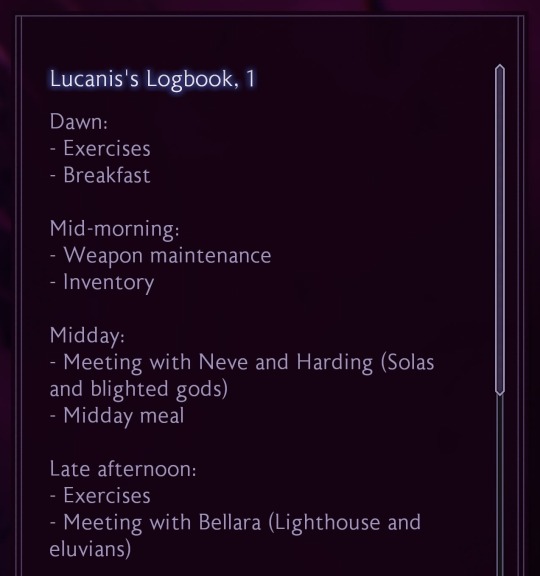
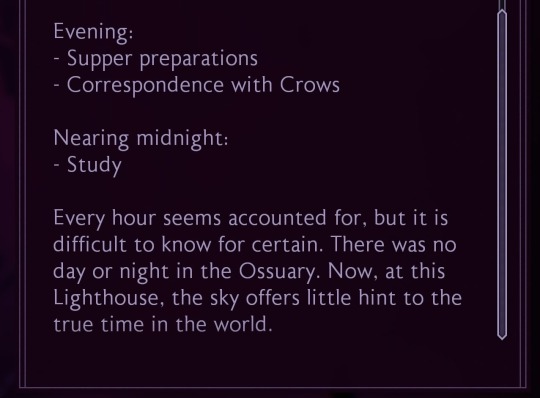
Entry 2
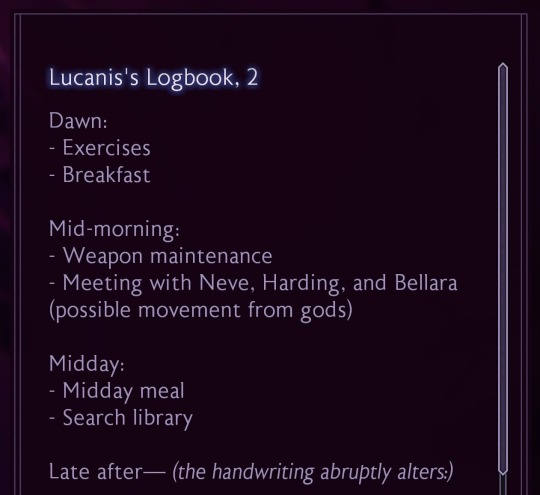
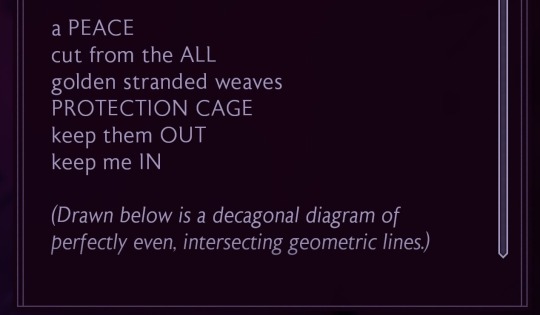
Entry 3
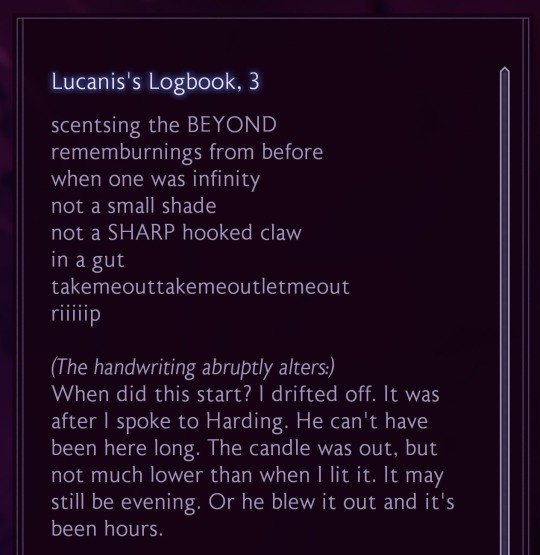

Entry 4
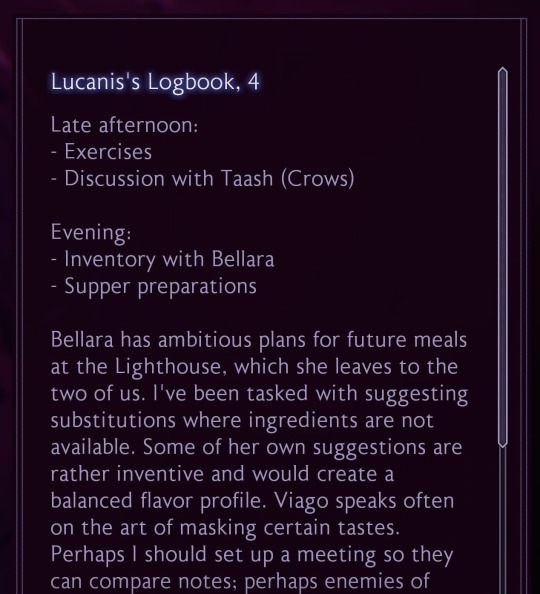
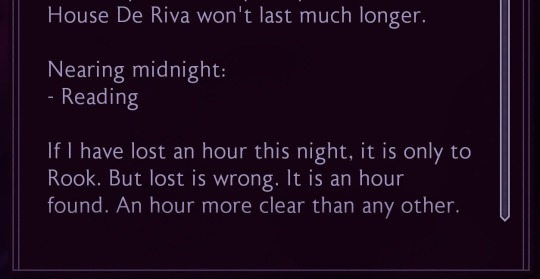
Entry 5
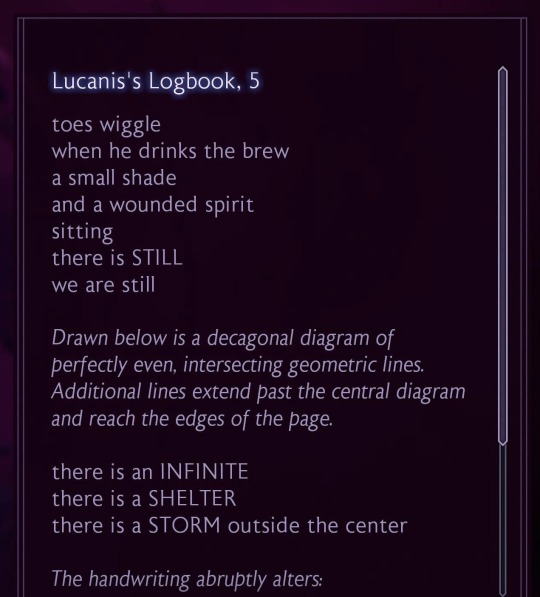
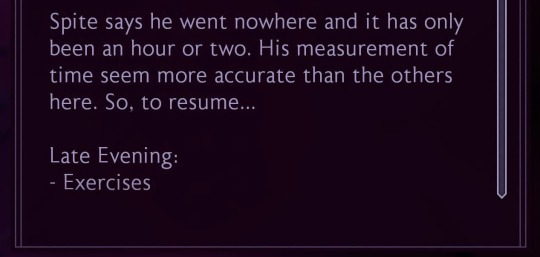
Text of all five below, for your easy reference ♡
Entry 1
Lucanis's Logbook, 1
Dawn:
Exercises
Breakfast
Mid-morning:
Weapon maintenance
Inventory
Midday:
Meeting with Neve and Harding (Solas and blighted gods)
Midday meal
Late afternoon:
Exercises
Meeting with Bellara
Evening:
Supper preparations
Correspondence with Crows
Nearing midnight:
Study
Every hour seems accounted for, but it is difficult to know for certain. There was no day or night in the Ossuary. Now, at this Lighthouse, the sky offers little hint to the true time in the world.
Entry 2
Lucanis's Logbook, 2
Dawn:
Exercises
Breakfast
Mid-morning:
Weapon maintenance
Meeting with Neve, Harding, and Bellara (possible movement from gods)
Midday:
Midday meal
Search library
Late after— (the handwriting abruptly alters:)
a PEACE
cut from the ALL
golden stranded weaves
PROTECTION CAGE
keep them OUT keep me IN
(Drawn below is a decagonal diagram of perfectly even, intersecting geometric lines.)
Entry 3
Lucanis's Logbook, 3
scentsing the BEYOND rememburnings from before when one was infinity not a small shade not a SHARP hooked claw in a gut
takemeouttakemeoutletmeout
riiiiiiiip
(The handwriting abruptly alters:)
When did this start? I drifted off. It was after I spoke to Harding. He can't have been here long. The candle was out, but not much lower than when I lit it. It may still be evening. Or he blew it out and it's been hours.
I'll ask Emmrich of Neve for an estimate of the time.
Entry 4
Lucanis's Logbook, 4
Late afternoon:
Exercises
Discussion with Taash (Crows)
Evening:
Inventory with Bellara
Supper preparations
Bellara has ambitious plans for future meals at the Lighthouse, which she leaves to the two of us. I've been tasked with suggesting substitutions where ingredients are not available. Some of her own suggestions are rather inventive and would create a balanced flavor profile. Viago speaks often on the art of masking certain tastes.
Perhaps I should set up a meeting so they can compare notes; perhaps enemies of House De Riva won't last much longer.
Nearing midnight:
- Reading
If l have lost an hour this night, it is only to Rook. But lost is wrong. It is an hour found. An hour more clear than any other.
Entry 5
Lucanis's Logbook, 5 toes wiggle
when he drinks the brew a small shade and a wounded spirit sitting
there is STILL
we are still
Drawn below is a decagonal diagram of perfectly even, intersecting geometric lines.
Additional lines extend past the central diagram and reach the edges of the page.
there is an INFINITE there is a SHELTER
there is a STORM outside the center
The handwriting abruptly alters:
Spite says he went nowhere and it has only been an hour or two. His measurement of time seem more accurate than the others here. So, to resume...
Late Evening:
- Exercises
#lucanis's logbook#lucanis's logbooks#lucanis x rook#dragon age lucanis#lucanis dellamorte#veilguard spoilers#dragon age veilguard#dragon age codex#antivan crows#spite dellamorte#spite dragon age
98 notes
·
View notes
Text
Reading back over my favorite Fen'Harel story, The Slow Arrow, and...
"When did I say that I would save you?" is such a Solas line.
Like, in the Veilguard gameplay trailer, he has the "People are always dying. It's what they do." And it comes across as so villain mustache twirly IGAF. But those of us who understand Solas know that it's a lament! He's upset that people are always dying and that his actions have contributed to it!
"When did I say that I would save you?" hits the same villain mustache twirly IGAF vibes. But he's not saying he doesn't care. He's saying, "You asked me to kill the beast, not save your village. WTF are you still doing here?" Like it's such a spirit of wisdom, deer in the headlights, that wasn't part of the plan that we discussed, why would you automatically assume you are safe? Evacuate the village, you idiots.
Solas understand what's going on. He can't understand why other people don't understand what's going on. That's why he comes across as such an asshole in so many situations. Like, talking about the Wardens, for example. He knows what the Blight is. He fought against a bunch of gods who tried to use it. Of course, he's going to think the Wardens are fucking crazy. No, he's not going to explain why to everyone - isn't it obvious?!?! If you're too stupid to understand, why should I explain it to you?!?! "This is beyond your comprehension."
He's such a self-destructive idiot.
I love him.
144 notes
·
View notes
Note
I really love your metas! I have a few questions and I’m very interested in your opinion.
Could you elaborate on how you interpret Solas’s romantic connection with Mythal and his love for Lavellan? In the game, there is a line stating that before Lavellan, Solas had never been in love and didn’t even know what it was, which makes me question the idea of romance with Mythal.
I played Inquisition only after Veilguard and was surprised that many perceive Solas as someone capable of casual sexual encounters without emotional depth. In his romance with Lavellan, he seems utterly captivated by her and incredibly respectful, he practically radiates tenderness and deep adoration toward her. Such behavior doesn’t seem believable to me for a man with extensive sexual experience. To me he seemed more like a demisexual. His love for the atmosphere of intrigue and tension didn’t convince me of his sexual 'promiscuity'. After all, one can enjoy that kind of atmosphere without actually engaging in physical pleasures. He seems very restrained when it comes to his physical body. I wouldn’t even be surprised if he had no sexual experience at all or if his experience was extremely limited. I also got the impression that Mythal wouldn’t have lowered herself to her 'doggo' in that regard.
thank you dear <3 im always happy to yap
for me, the moment i saw that mural of mythal stepping away from solas's embrace and calling him "love", i went "oh my god they were lovers" and nothing has successfully convinced me otherwise since LMAO. obviously the game very deliberately leaves it up for interpretation, and i totally understand why people dont interpret it as such. however i do think the game does deliberately suggest it for the people who want to run with it, but subtly enough that you can ignore it if you want. for me, "i will follow you wherever you go", calling him "love", his request that she basically run away with him, the resentment between them afterwards, all reads like romantic love to me. i also just enjoy the crazy fucking drama that the idea of them being lovers adds to literally everything. it especially adds to solavellan in my opinion, though many would argue it takes away. i think it adds juiciness and context. i also think many of the parallels to solavellan further suggest that solythal was romantic. but i also think calling them just lovers is incomplete, the same way i think calling them just friends or just vaguely mother/son, queen/knight, goddess/devotee or whatever else would incomplete. their relationship clearly does not conform to modern thedas's idea of love; both bellara and mythal herself say this and i believe them. mythal herself says no one mortal could understand their connection and its one of my favorite lines of hers. how could we ever understand what its like to love someone for thousands and thousands of years? what shapes might that love take over millennia? all of them, i'd wager.
just because i believe they were lovers does not mean i think their relationship resembled anything like what he has with lavellan. i think the immortal nature of their love is the key to the distinction. i dont think they were every anything remotely resembling monogamous. their relationship was fundamentally unequal (so is solavellan but in a different way lol). mythal probably used the amorphous nature of their relationship as a tool for manipulation. while solas was devoted and loyal, she was hot and cold. veilguard weirdly forgets this, but according to myth she was MARRIED (or the ancient equivalent) to elgar'nan this whole time too. it is elgarnan who is the sun, and mythal who is the moon, and solas the wolf that howls after it LMFAOOO. solas was quite literally secret third thing. he loved her like a goddess. she loved him like her loyal guard dog. he knew it and resented her for it but could not help loving her still. i dont think this makes it any less romantic love, it just makes it really fucked up romantic love, unrecognizable from how we'd recognize it, or how modern thedas would.
@/baphometsss wrote a banger the other day about how solas's love for mythal and felassan differs from his love for those he meets later (lavellan but also his friends in the inquisition) because his relationship with them is characteristic of how spirits love. i really loved this interpretation because even though i dont agree with all of it (which ill get to in a moment), i think people do misunderstand what i mean when i say i am a solythal lovers truther, and this post clarifies it. solas loves mythal in the way immortal spirit god-beings love each other. solas loves lavellan the way a mortal man loves a mortal woman. both can be romantic, both can involve sex, but the core of the love is very different; especially when the crux of solas's story is learning to be a man instead of a spirit/god.
i know a lot of people interpret that line (assuming you're talking about the "the dread wolf could not foresee what it would mean to fall in love") as meaning the dread wolf has never been in love and honestly... i have never understood that interpretation. like if thats your vibe and you choose to take it that way because you wanna headcanon it, amazing. have a great time. but i see so many people taking it as gospel as if it literally says "solas has never experienced love before" which it simply does not say. it says he could not have anticipated what it would mean to fall in love, and to me, there is a big "now, in 9:41 dragon, with a mortal woman" implicit at the end. im making assumptions about the intention too, but i think both are fundamentally interpretations, and the game once again does not say for certain either way. i think they did this intentionally the way they kept the nature of the solythal relationship vague. but yeah i dont interpret it that lavellan is solas's first love. i think mythal is, sorry LOL. but it doesnt really matter because their relationship was a fucking mess and he resents her just as much as he loves her so who cares.
this is just something i was pondering earlier when i first saw this message this morning but i think this is where the distinction between immortal godly vs. mortal human love comes back into play. i am not sure that immortal beings would be capable of love in the same way that mortals are, because there is no threat of loss. imagine how different it would be to love without the inevitability of grief? all the time in the world, all the power you could ever want. what would that look like? how would it feel? would you love as deeply if you knew it was eternal? now imagine that changes; suddenly you are powerless. suddenly, you have so much to lose. how would love feel, then? it makes me think of that quote that is always attributed to the illiad but is actually from the 2004 movie troy and written by david benioff which makes me want to fucking die but anyway the quote is relevant nonetheless; "the gods envy us because we are mortal... everything is more beautiful because we're doomed." i think falling in love with lavellan forces solas into an understanding of love he has never experienced before. and it fucks him up really bad. lavellan's mortality forces solas into the desperate, frantic, tragic mindset of a man in love with a ticking clock. we see time and time again that he cannot act like a god around her. he tries at first. he fails and cracks every time. he sees her in trespasser and literally falls to his knees to kiss her one last time. in veilguard he reveals that it was a relief that she allowed him to just be himself. i think what makes solas's love for lavellan unique and special is not that its his first, but that it is humanizing. mythal required solas to become a god to serve her purpose. he loved her through it all even if it ruined him. lavellan asked for absolutely nothing except the truth. he loved her through it all and it ended up saving him. to me, both are romantic loves that achieve very, very different ends.
now to get to the sex. the interpretation of solas as someone who Fucks mostly comes from 1. his mind-boggling age, 2. his comments about being very different when he was young; "hot-blooded and cocky", and 3. the comfort with which he pretty explicitly flirts with lavellan. in my interpretation, all of these things do indicate at least a level of confidence and experience with sex, though not necessarily a raging libido. i agree that solas is probably demisexual, at least when we meet him. i think it makes sense with his nature as a spirit. but i also dont think that means he never had casual sex ever in his THOUSANDS of years of life. or that he didnt have plenty of emotionally charged sexual experiences, rather than casual ones. i mean we are talking a lifespan of at LEAST 7,600 YEARS. AT LEAST! we even know that spirits fuck from a codex in trespasser LMFAO. i dont think its fair to say that his tenderness and adoration with lavellan excludes him from having fucked crazy style in his youth. i do think that sex is not at the top of his mind, and that he still clearly struggles with the mortal impulse of sexual desire that his body would have created, and that his instinct is to deny himself those desires. i just dont see him always having been that way, and i think his comments support that he was different when he was young. i just dont know how a virgin would slip in that indomitable focus line so smoothly you dont even realize what he just implied until you walk away and realize you're blushing. i do think sex and physical intimacy is an important part of his relationship to lavellan though, whether it is present or absent, because its consistent with this theme of the physical versus the spiritual, god versus man that he is constantly struggling with. i am trying to tie this all together but honestly ive lost the plot. asexual solas is valid and actually a lot of what i love about solavellan is that sex is relevant thematically but it is not the foundation of the relationship. i always like to say that sex haunts their relationship, a heavy presence just out of frame that both of them are trying not to look towards. i think its soooo juicy. but i also just like the idea that young cocky solas who canonically used to gambled also was a playboy. come on he NEEDS to get that hair pulled
65 notes
·
View notes
Text

After making some polls on favorite romances in every Dragon Age game, I want to find out which is the most popular one across the series. As Tumblr allows a maximum of 12 options for polls, I took the top 3 most voted ones from the previous polls.
So, without further ado,
Previous results:
Dragon Age Origins:
Dragon Age 2:
Dragon Age Inquisition:
Dragon Age The Veilguard:
#dragon age#dragon age inquisition#may the dread wolf take queue#dragon age 4#dragon age veilguard#dragon age the veilguard#dragon age origins#dragon age 2#datv#dav#da veilguard#da the veilguard#veilguard#da inquisition#da: inquisition#dai#da2#dao#da origins#origins#dragon age alistair#alistair romance#alistair dragon age#alistair theirin#alistair#alistair x warden#alistair x tabris#dragon age leliana#leliana#da zevran
51 notes
·
View notes
Text
Yep, this is my new favorite line.
“I just want you to be happy, you idiot!”

Solas, you dumb ass motherfucker.
I don’t care that we’re going somewhere terrible.
As long as you don’t go there alone, and I can make you damn smile, it’s all I’ve ever wanted since Trespasser, you dumb fuck.
💍
39 notes
·
View notes